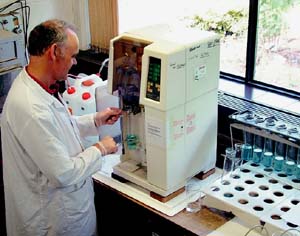| 2004 |

|
YEAR BOOK |
State Laboratory
|
Prevention of fraud – chemistry working for Customs
|

Exports of certain agricultural products outside the EU attract export refunds. These depend on the tariff classification, and on EU regulations for agricultural product classification, or on composition criteria agreed with the Department of Agriculture and Food.
Products must be analysed to determine or confirm the tariff classification, export refund classification or product composition. The State Laboratory is responsible for this analysis and for the interpretation of the analytical results.
A broad range of products – e.g. plastics, minerals, fertilizers, pharmaceuticals, textiles, paper, pottery, adhesives – are analysed for tariff classification purposes. The analyses carried out on non food products vary depending on the tariff heading and involve many different techniques – including infra-red spectroscopy, mass spectrometry and x-ray fluorescence.
Food analysis is the predominant work for export refund control. The food products are analysed for protein, starch, sugars, casein, total fat, butterfat, collagen, glycomacropeptide, moisture and ash contents, as appropriate. Analysis is also performed on meat samples to determine the sex and species of the animal that produced them.
The Customs and Excise Tariff of Ireland implements EU regulations on tariff classification, which in turn derive from the Harmonized Commodity Description and Coding System of the World Customs Organisation. This standard Customs nomenclature has been developed to ensure: a) The systematic classification of all goods found in international trade; b) Internationally uniform classification of all goods on a sound basis in the tariffs of all countries; c) The adoption of a common internationally accepted Customs 'language' so that Customs terminology should be readily understood by experts and the public alike, thus simplifying the task of importers, exporters, producers, carriers and Customs administrations; d) Simplicity and certainty of meaning in the negotiation, application and correct interpretation of bilateral or multilateral Customs agreements; e) An internationally uniform collation of data to facilitate analysis and comparison of world trade statistics.
A substantial part of the work of tariff classification in the State Laboratory involves giving advice on chemical aspects of classification to the Revenue Commissioners, and representing Ireland at EU and World Customs Organisation technical committees. These technical committees consider the interpretation of headings and changes to the tariff, and decide on the classification of contentious products.
Contact: Dr Siobhán Ní Ghríofa;
E-mail: [email protected] ; Web: www.statelab.ie